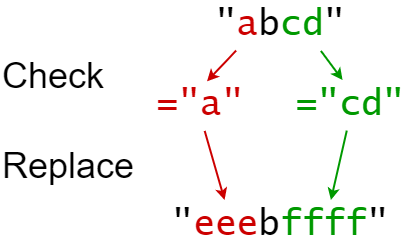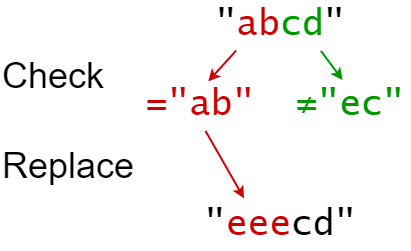 字符串中的查找与替换Java
字符串中的查找与替换Java
文章发布较早,内容可能过时,阅读注意甄别。
# 题目
你会得到一个字符串 s (索引从 0 开始),你必须对它执行 k 个替换操作。替换操作以三个长度均为 k 的并行数组给出:indices, sources, targets。
要完成第 i 个替换操作:
- 检查 子字符串 sources[i] 是否出现在 原字符串 s 的索引 indices[i] 处。
- 如果没有出现, 什么也不做 。
- 如果出现,则用 targets[i] 替换 该子字符串。
例如,如果 s = "abcd" , indices[i] = 0 , sources[i] = "ab", targets[i] = "eee" ,那么替换的结果将是 "eeecd" 。
所有替换操作必须 同时 发生,这意味着替换操作不应该影响彼此的索引。测试用例保证元素间不会重叠 。
- 例如,一个 s = "abc" , indices = [0,1] , sources = ["ab","bc"] 的测试用例将不会生成,因为 "ab" 和 "bc" 替换重叠。
在对 s 执行所有替换操作后返回 结果字符串 。
子字符串 是字符串中连续的字符序列。
示例 1:

输入:s = "abcd", indexes = [0,2], sources = ["a","cd"], targets = ["eee","ffff"]
输出:"eeebffff"
解释:
"a" 从 s 中的索引 0 开始,所以它被替换为 "eee"。
"cd" 从 s 中的索引 2 开始,所以它被替换为 "ffff"。
示例 2:

输入:s = "abcd", indexes = [0,2], sources = ["ab","ec"], targets = ["eee","ffff"]
输出:"eeecd"
解释:
"ab" 从 s 中的索引 0 开始,所以它被替换为 "eee"。
"ec" 没有从原始的 S 中的索引 2 开始,所以它没有被替换。
提示:
- 1 <= s.length <= 1000
- k == indices.length == sources.length == targets.length
- 1 <= k <= 100
- 0 <= indexes[i] < s.length
- 1 <= sources[i].length, targets[i].length <= 50
- s 仅由小写英文字母组成
- sources[i] 和 targets[i] 仅由小写英文字母组成
# 思路
startsWith
# 解法
class Solution {
public String findReplaceString(String s, int[] indices, String[] sources, String[] targets) {
int k = indices.length;
int[] arr = new int[s.length()];
for(int i=0; i<k; i++){
if(s.startsWith(sources[i],indices[i])){
arr[indices[i]] = i + 1;
}
}
StringBuilder sb = new StringBuilder();
for(int i=0; i<arr.length; i++){
if(arr[i] == 0) sb.append(s.charAt(i));
else {
sb.append(targets[arr[i]-1]);
i += (sources[arr[i]-1].length()-1);
}
}
return sb.toString();
}
}
1
2
3
4
5
6
7
8
9
10
11
12
13
14
15
16
17
18
19
20
21
2
3
4
5
6
7
8
9
10
11
12
13
14
15
16
17
18
19
20
21
# 总结
- 分析出几种情况,然后分别对各个情况实现


